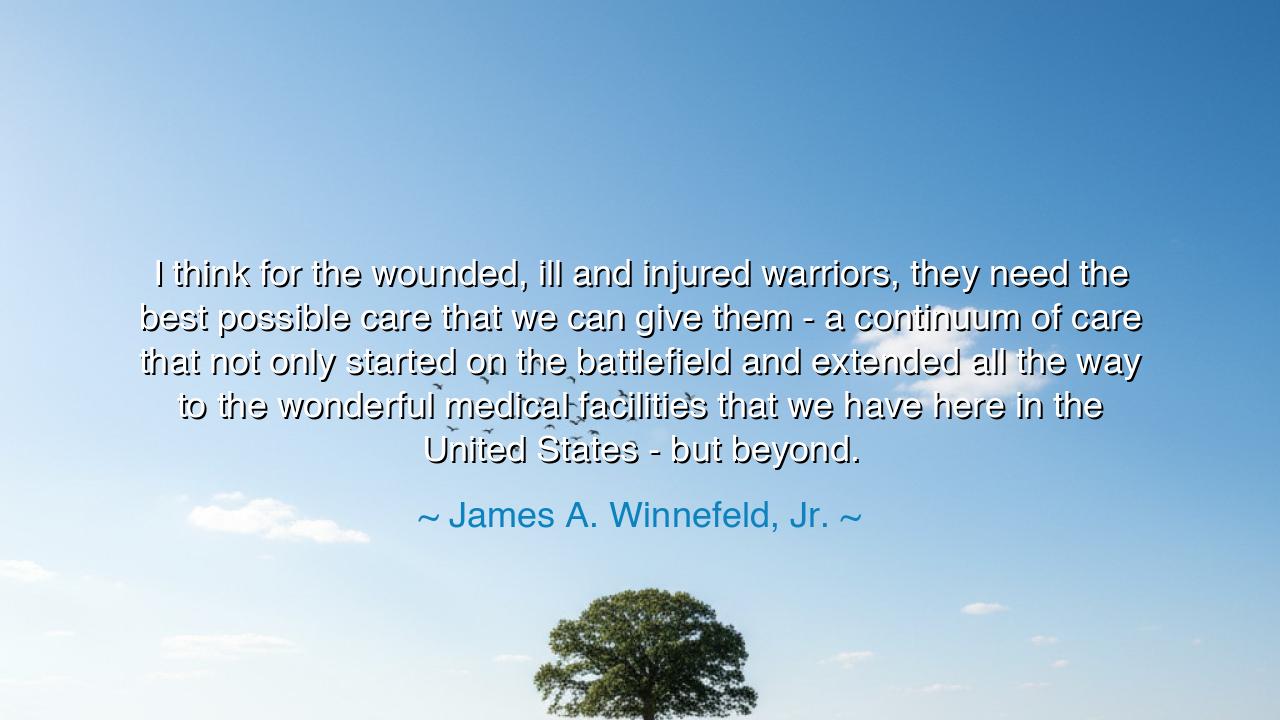
I think for the wounded, ill and injured warriors, they need the
I think for the wounded, ill and injured warriors, they need the best possible care that we can give them - a continuum of care that not only started on the battlefield and extended all the way to the wonderful medical facilities that we have here in the United States - but beyond.






Hear the solemn words of James A. Winnefeld, Jr., admiral and guardian of warriors: “I think for the wounded, ill and injured warriors, they need the best possible care that we can give them—a continuum of care that not only started on the battlefield and extended all the way to the wonderful medical facilities that we have here in the United States—but beyond.” In this declaration lies the heart of duty: that those who sacrifice their strength for the safety of their people deserve not fleeting gratitude, but an unbroken chain of care, from the moment of injury until the end of their days.
The meaning is profound. For the warrior’s wound is not always healed by bandages alone. It begins on the battlefield, where blood is shed and pain begins, but it continues into hospitals, into homes, into silent nights haunted by memory. Winnefeld speaks of a continuum of care because healing is not a single act, but a lifelong journey. It requires medicine for the body, compassion for the heart, and honor for the spirit. To fail in this duty is to betray the very ones who once stood as shields for their nation.
History gives us bitter lessons in this truth. Recall the Vietnam War, when many returning soldiers, wounded in body and spirit, found not care but neglect. They bore scars of jungle battles, yet at home they met scorn, misunderstanding, and insufficient medical support. Many lived and died in silence, abandoned by the people they had defended. This neglect remains a shadow upon the nation’s memory, a reminder of what happens when the continuum of care is broken. Winnefeld’s words rise against such failures, calling his generation and those after to do better.
There are also shining examples. In the days after World War II, nations built vast systems of hospitals, rehabilitation programs, and veteran services, recognizing that the defenders of freedom needed more than medals—they needed care for their bodies and hope for their futures. The GI Bill offered education and opportunity, healing wounds not only of flesh but of dignity. These efforts showed that gratitude is not a ceremony, but a responsibility fulfilled through tangible action. Here lies the living embodiment of Winnefeld’s vision: care that extends beyond the battlefield into the whole of life.
The origin of this quote is found in the admiral’s role as a leader of soldiers and sailors who saw firsthand the price of war. Speaking not from theory but from experience, he bore witness to the broken bodies of the brave, carried from dust and fire into the hands of medics. He understood that the duty of a nation does not end when the battle is done, but continues in the long, often unseen, work of restoring the warrior to wholeness. His words, therefore, are both a command and a plea: never abandon the wounded.
The lesson, child of tomorrow, is this: honor must be more than words. If you praise the courage of warriors, you must also care for them when they are weak. If you benefit from the shield of their sacrifice, you must be the hands that bind their wounds. Let your gratitude be active—support hospitals, aid families, listen to the stories of the wounded, and stand by them in their long recovery. For in caring for them, you care for the very heart of your nation.
To live by this wisdom, look not only to the glorious victories of battle, but to the quiet victories of healing. Remember that the hero is not finished when the war is done; the hero’s journey continues in the slow rebuilding of body and spirit. Be part of that journey. Give where you can, serve where you are able, and respect always the cost that others have borne for your peace.
Thus the words of James A. Winnefeld, Jr. endure: “They need the best possible care… a continuum of care… beyond.” Let them remind you that true honor is not in monuments of stone, but in lives restored, in wounds tended, in dignity preserved. And may every generation after us rise to this responsibility, ensuring that no warrior’s sacrifice is met with neglect, but always with the unbroken gift of care.






AAdministratorAdministrator
Welcome, honored guests. Please leave a comment, we will respond soon